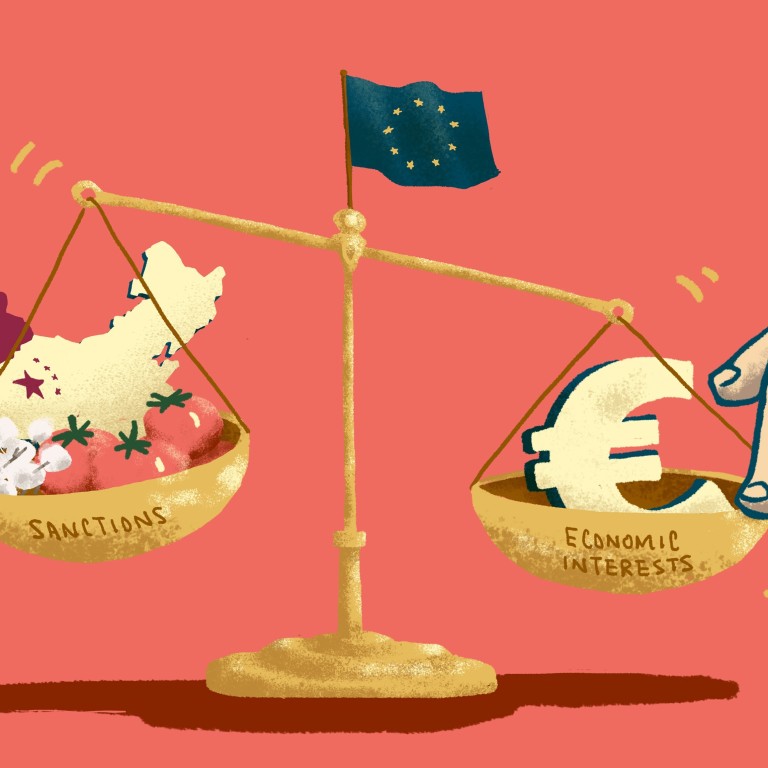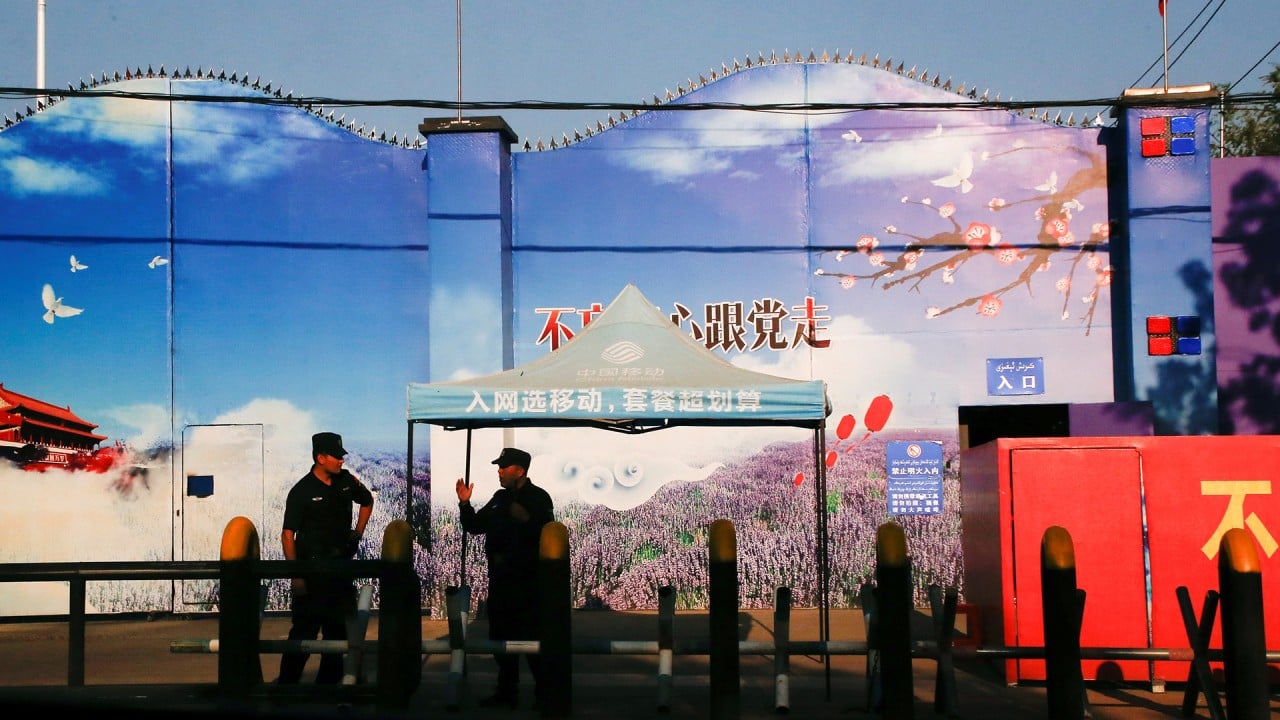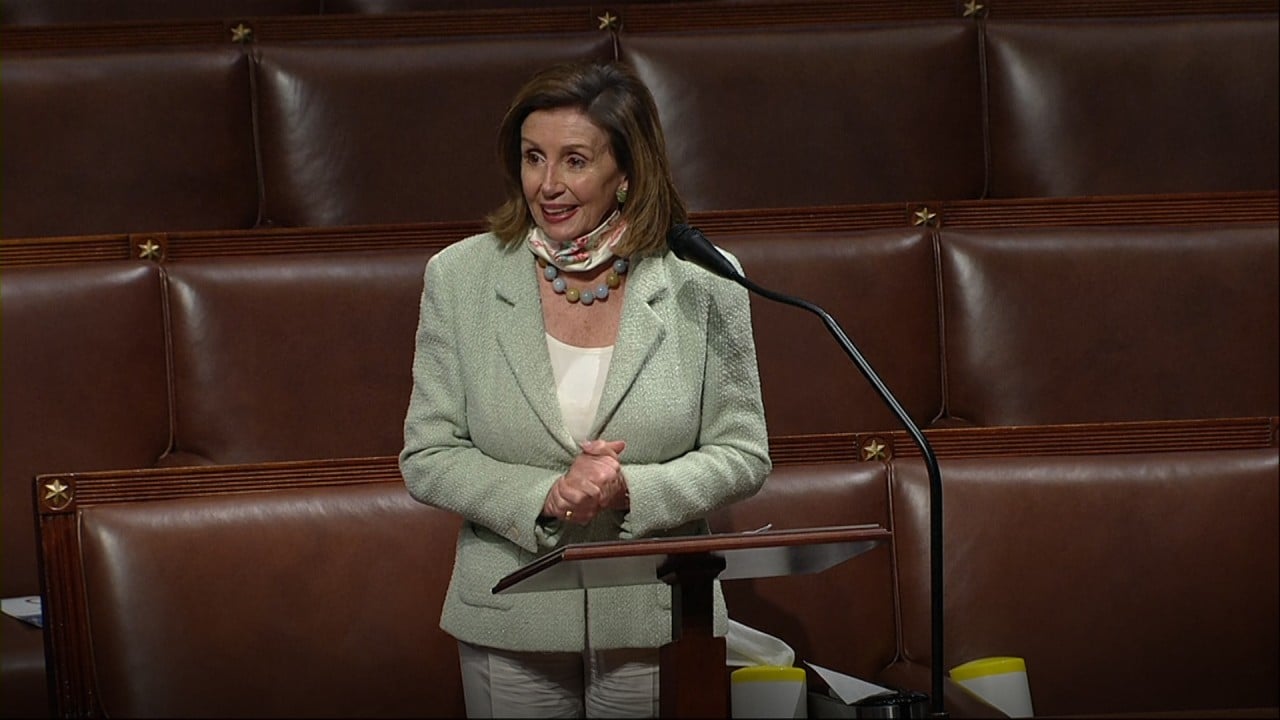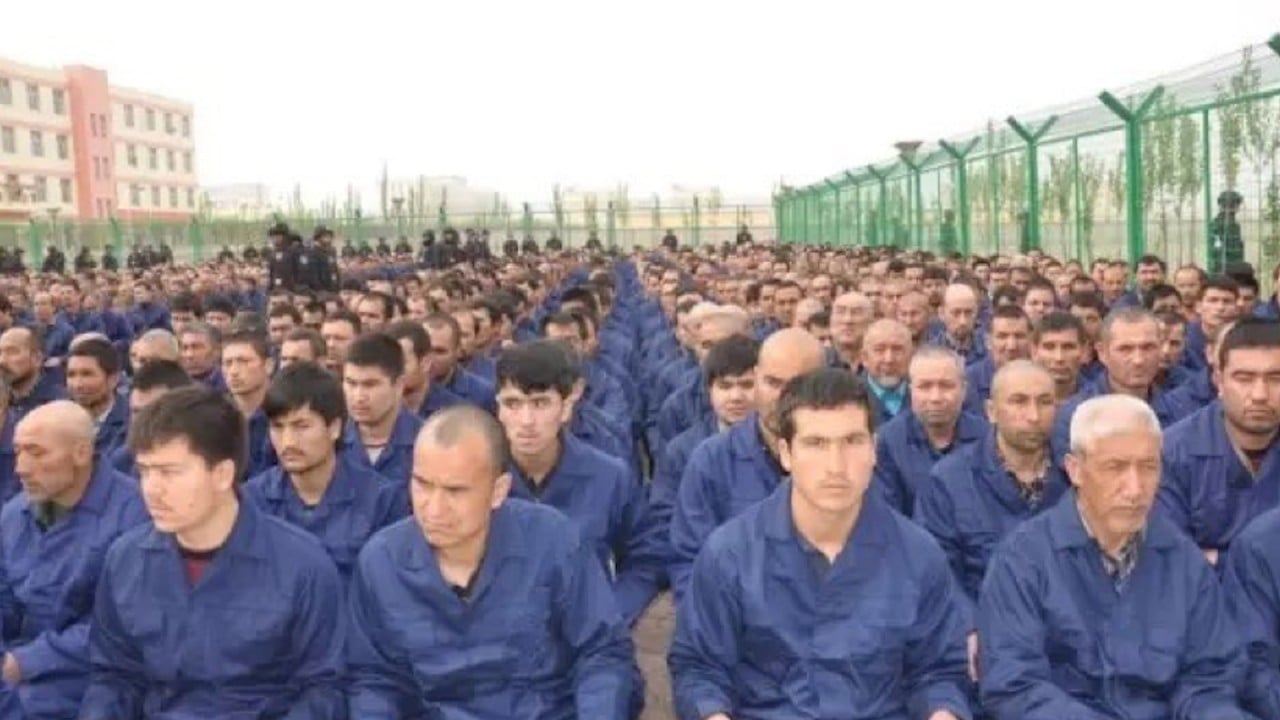
Soaring EU-Xinjiang trade in textile machinery, tomatoes piles pressure on Brussels to act on alleged forced labour
- German-made exports of machinery parts for Xinjiang’s textiles industry are soaring, despite evidence of forced labour
- Pressure is on the EU to act on forced labour allegations after signing an investment deal with China in December
From the ancient ports of southwest Italy to the industrial heartlands of Germany, European companies are enjoying strong trade with China’s Xinjiang region amid increasing pressure on Brussels to act against allegations of forced labour and other human rights abuses there.
The EU currently has no outright bans or sanctions directly linked with Xinjiang, but it is under pressure to act amid an outpouring of criticism against the Comprehensive Agreement on Investment (CAI) and as evidence of human rights abuses in Xinjiang continues to mount.
Although the deal says China must progress towards ratifying the forced labour provisions of the International Labour Organization, critics have slammed it for being too weak.
Chinese customs records examined by the South China Morning Post showed that in 2020, trade continued briskly.
Shipments of German-made parts and accessories for textiles machinery in Xinjiang hit a record high of US$41.2 million last year, a staggering 2,763 per cent increase since 2017, when detailed records began.
This was the vast majority of all such parts entering Xinjiang last year, as German exporters took advantage of China’s industrial recovery from the coronavirus pandemic. The second highest exporter was Switzerland, shipping just US$680,279 worth.
A Chinese textiles executive, who did not want to be named due to the sensitivity of the issue, said that German and Swiss companies are now dominant in this sector, largely because of their textiles heritage.
“But we are seeing a lot more Chinese acquisitions of European companies recently, eventually China will be able to make these parts on their own,” he said.

02:27
US declares China has committed genocide in its treatment of Uygurs in Xinjiang
The parts can be replacements for equipment across the textiles manufacturing chain, from the carding machines that disentangle, clean and intermix fibres to the combing machines that layer the fibres out ahead of spinning, or the spinning machines themselves – all vital components for any smoothly run textiles plant, according to experts.
A spokesman for the Hong Kong Research Institute of Textiles and Apparel said that without access to replacement parts such as loom reeds, healds and heald-frames – which fall into this category of imports – factories would be faced with huge problems.
Xinjiang produces 85 per cent of China’s cotton and 20 per cent of the global total. The industry has been heavily implicated in alleged human rights abuses in the autonomous region, which is home to large populations of Uygurs and other Muslim minorities.
In December, an analysis of Chinese government documents by the Washington-based Centre for Global Policy found that in 2018, “at least 570,000” people had been forcibly mobilised to pick cotton in the Xinjiang region.
“Xinjiang’s total labour transfer of ethnic minorities into cotton picking likely exceeds that figure by several hundred thousand. Despite increased mechanisation, cotton picking in Xinjiang continues to rely strongly on manual labour,” the report read.
The US targeted the sprawling Xinjiang Production and Construction Corps (XPCC) last July with sanctions under the Magnitsky Act, with Europe yet to follow suit, despite passing legislation allowing it to adopt its own Magnitsky-style human rights sanctions in 2020.
Tomato products from Xinjiang are inextricably linked to the XPCC, analysts said, and have also been banned from the US market.
Italian imports of Xinjiang-made tomato paste hit US$62.5 million last year, an increase of 164 per cent from 2017’s level. For years, Italy has been the biggest buyer of the products, with customs records also showing it to be the only nation shipping vegetable-picking machinery to the region last year.
Importers along Italy’s southwest coast have long been buying up cheap tomato paste from Xinjiang in triple concentrate form, before adding salt and water to convert it to double concentrate, when it is stamped with a product of Italy label.
Tomatoes account for around 5 per cent of the Xinjiang economy – they are integral to the government’s income
It is then re-exported around Africa and the Middle East, often at a price so cheap that it puts local farmers out of business, said Stefano Liberti, an Italian author whose 2017 book I Signori del Cibo (Lords of Food) highlighted the trade links.
“The whole system is built around XPCC and Cosco Tunhe, so if [the EU] sanctions either of these companies the whole supply chain is broken,” Liberti told the Post. “There are 30 to 35 processing plants in the region and they all belong to those two companies, they control the whole market.”
“Tomatoes account for around 5 per cent of the Xinjiang economy – they are integral to the government’s income,” said Lianchao Han, a former Chinese foreign ministry staffer and veteran advocate for Chinese human rights in Washington.
“Cosco Tunhe has extensive cooperation with XPCC, it contracts to buy tomatoes from XPCC and sold 35 per cent ownership of its sugar company to XPCC. Chalkis is owned by XPCC’s 6th division,” said Han, laying out the links between the dominant tomato grower and the paramilitary organisation that runs large swathes of the region.
The industry is expecting a hit.
Kraft-Heinz, one of the world’s biggest tomato product companies, registered to lobby on the Uygur Forced Labour Prevention Act on January 19, according to congressional filings. Among the lobbyists named was Abigail Blunt, wife of Missouri Senator Roy Blunt, though the filing said that she “does not lobby Senate”.
Last year, The Wall Street Journal reported that 5 per cent of Kraft-Heinz’s tomato supply came from Xinjiang, although none of that was sold in the US. The company, which has a presence throughout Europe, did not respond to requests for comment.
The booming commercial ties highlight Brussels’ quandary, as it faces pressure to be tougher on human rights abuses, but also struggles to keep the floundering European economy afloat.
Italian members of the European Parliament said the tomato paste trade was hurting the iconic image of Italian food.

03:21
US House of Representatives sends Uygur Human Rights Policy Act to Trump’s desk for approval
“Even if Italian companies clarified that tomato paste imported from Xinjiang is not destined for the domestic retail market, but is rather processed and resold … I cannot but think that this still creates damage to ‘Made in Italy’,” said Eleonora Evi, a Green Party politician from Italy and a member of the Parliament’s Delegation for relations with China.
Annalisa Tardino, from the right-wing Identity and Democracy Group and also a member of the China delegation, said “the phenomenon of the import of semi-finished tomato products into the EU – especially through our country – clearly affects the value of our supply chain”.
But at the same time, European businesses remain desperate to continue selling to China’s giant economy. A recent survey by the German Chamber of Commerce in China found that 96 per cent of respondents have “no plans to leave the Chinese market”, while “72 per cent plan further investments” there.
“Businesses expect to trade with China, it is unrealistic to expect otherwise,” said one European diplomat in Hong Kong, speaking anonymously. “The human rights debate creates a headache.”
It is unacceptable that the EU has caved on human rights to seal its investment deal with China
“The EU was wrong to try to sell the forced labour language in its investment agreement with China as a major achievement,” said Noah Barkin, senior visiting fellow at the German Marshall Fund.
“But it does have other tools to respond to the horrific situation in Xinjiang. The question is whether it will use those tools. Unanimity [among EU member states] is required to impose sanctions, and that is a very high bar.”
“It is unacceptable that the EU has caved on human rights to seal its investment deal with China. The message from Belgium and across Europe must be clear: no deal without China’s ratification of international forced labour standards,” said Samuel Cogolati, IPAC co-chair and co-author of a resolution introduced in the Belgian national parliament on Thursday calling for the government to “declare the persecution of Uygur Muslims and minorities a ‘genocide’.”
Belgium, for its part, imported 2,280 per cent more girls’ jackets from Xinjiang last year than a year earlier, while shipments of Christmas decorations from Xinjiang to Belgian soared 1,500 per cent.

01:09
China claims most Muslim detainees have left Xinjiang re-education camps and returned to society
The US Department of Labour last year named Christmas decorations as a Chinese-made products believed to be produced by child or forced labour, while jackets are part of the labyrinthine textiles industry, where malpractices have been highlighted in detail.
China has strongly denied the charge of genocide. At a press conference in Beijing last month, foreign ministry spokesman Zhao Lijian said: “There’s never ever such thing as genocide in China. Period.”
Facing down the criticism over the CAI, some EU officials have been at pains to emphasise that the deal should be viewed as a straight investment agreement, rather than a deal on human rights.
The commission’s director general for trade, Sabine Weyand, has spoken on numerous occasions recently of the EU’s “toolbox” for dealing with China, which includes the CAI, sanctions, and a draft bill to rid the supply chain of forced labour that is expected later this year.
The situation in Xinjiang speaks to the need for EU lawmakers to ensure the swift adoption of a robust and effective due diligence legislation
“If we go along with CAI … we really need to have the [supply chain] legislation on due diligence on board, we really need to get serious on [International Procurement Instrument rules on government purchasing], we really need to look at our global sanctions instruments. And already this is not theoretical. There’s good discussion I’m already seeing now happening in the EU,” Weyand told a webinar last month.
Campaigners have urged the commission to act with urgency.
“The situation in Xinjiang speaks to the need for EU lawmakers to ensure the swift adoption of a robust and effective due diligence legislation, which should ensure that good produced through forced labour or other serious abuses throughout the value chain can never enter the EU market,” said Claudio Francavilla, EU advocacy officer at Human Rights Watch.

